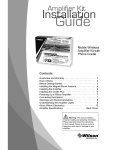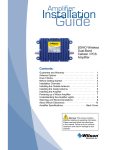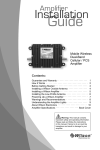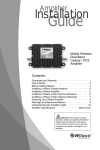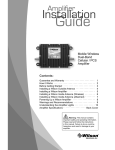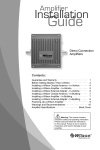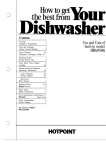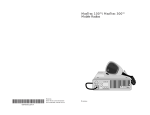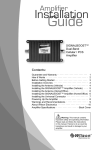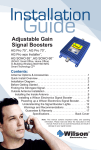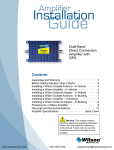Download Wilson Electronics 271245 Specifications
Transcript
Amplifier Kit Installation stallat stallatio Guide Mobile Wireless Amplifier Kit with Phone Cradle Contents: Guarantee and Warranty · · · · · · · · · · · · · · · · · · · · · · · · 1 How it Works · · · · · · · · · · · · · · · · · · · · · · · · · · · · · · · · · 2 Before Getting Started · · · · · · · · · · · · · · · · · · · · · · · · · · 3 Installing the Magnet-Mount Antenna · · · · · · · · · · · · · · · 4 Installing the Amplifier · · · · · · · · · · · · · · · · · · · · · · · · · · 5 Installing the Cradle Plus · · · · · · · · · · · · · · · · · · · · · · · · 5 Powering Up a Wilson Amplifier · · · · · · · · · · · · · · · · · · · 7 Connecting the Earbud · · · · · · · · · · · · · · · · · · · · · · · · · · 7 Warnings and Recommendations · · · · · · · · · · · · · · · · · 8 Understanding the Amplifier Lights · · · · · · · · · · · · · · · · 9 About Wilson Electronics · · · · · · · · · · · · · · · · · · · · · · · 10 Amplifier Specifications · · · · · · · · · · · · · · · · · · Back Cover ! Warning: This manual contains important safety and operating information. Please read and follow the instructions in this manual. Failure to do so could be hazardous and result in damage to your amplifier. Wilson ® Electronics, Inc. 30-Day Money-Back Guarantee All Wilson Electronics products are protected by Wilson’s 30-day money-back guarantee. If for any reason the performance of any product is not acceptable, simply return the product directly to the reseller with a dated proof of purchase. 1-Year Warranty Wilson Electronics amplifiers are warranted for one (1) year against defects in workmanship and / or materials. Warranty cases may be resolved by returning the product directly to the reseller with a dated proof of purchase. Amplifiers may also be returned directly to the manufacturer at the consumer’s expense, with a dated proof of purchase and a Returned Material Authorization (RMA) number supplied by Wilson Electronics. Wilson shall, at its option, either repair or replace the product. Wilson Electronics will pay for delivery of the repaired or replaced product back to the original consumer. This warranty does not apply to any amplifiers determined by Wilson Electronics to have been subjected to misuse, abuse, neglect, or mishandling that alters or damages physical or electronic properties. RMA numbers may be obtained by phoning Technical Support at 866-294-1660. Operation is subject to the following two conditions: (1) This device may not cause interference, and (2) this device must accept any interference, including interference that may cause undesired operation of this device. Disclaimer: The information provided by Wilson Electronics, Inc. is believed to be complete and accurate. However, no responsibility is assumed by Wilson Electronics, Inc. for any business or personal losses arising from its use, or for any infringements of patents or other rights of third parties that may result from its use. Copyright © 2007 Wilson Electronics, Inc. All rights reserved. 1 Installation Instructions for the Following Wilson Amplifier: Mobile Wireless Dual-Band Amplifier Model # 271245 Part # 801213 FCC ID: PWO8012SM IC: 4726A-8012SM The term “IC” before the radio certification number only signifies that Industry Canada technical specifications were met. Inside this Package Wireless amplifier Cell Phone Cradle Plus Magnet-Mount Antenna Adhesive Bracket DC plug-in power supply Adhesive/Screw Swivel Bracket Earbud Air-vent Bracket How it Works Your new Wilson Mobile Wireless Amplifier Kit with Phone Cradle includes everything you need to begin enjoying improved cellular performance in mobile applications. Using this kit will amplify the signals to and from the cell phone that you place in its cradle, and will extend the range of other phones or cellular data cards in the vehicle. The kit includes the magnet-mount outside antenna, one of Wilson’s most popular products, which will collect the signal from the cell tower and send it through the cable to the mobile wireless dual-band amplifier. The amplifier’s state-of-the-art technology is designed to increase your signal up to 10 times, reduce disconnects and dropouts, and increase data communication rates needed for 3G technologies. The amplified signal is sent to the Cell Phone Cradle Plus, Wilson’s versatile phone cradle, which has the inside antenna built right in. Your cell phone or data card then communicates with the improved signal. When the cell phone or data card transmits, the signal goes through the cradle antenna, is then boosted by the amplifier and broadcast back to the cell tower through the outside antenna. Most importantly, the Cradle Plus provides a convenient place to stow a phone and allows the driver to keep both hands on the wheel while using the phone, greatly increasing safety. This kit includes three mounting options for installing the cradle on the dash or console of your vehicle. 2 Before Getting Started This guide will help you properly install Wilson’s Mobile Wireless Amplifier Kit with Phone Cradle. It is important to read through all of the installation instructions for this kit prior to installing any of the equipment. Read through this installation guide, visualize where all of the parts will be installed, and do a soft installation before mounting any equipment. If you do not understand the instructions in full, seek professional help, or contact Wilson Technical Support at 866-294-1660. ! Outside Antenna Warning: In a wireless installation, do not plug the amplifier directly into the cell phone or data card using an antenna adapter. It will damage the amplifier. Cell Phone Cradle Plus DC Power Supply Amplifier 3 Installing the Magnet-Mount Antenna To receive the best cell signal, select a location in the center of the vehicle’s roof that is 12 inches away from any other antennas and free of obstructions. ! Warning: Do not use any type of glassmount antenna with this amplifier. The outside antenna and Cradle Plus must be shielded from each other to prevent oscillation. The outside antenna must be installed vertically. Signal performance will be degraded if the antenna is not vertical. Magnet-Mount Antenna The antenna cable may be run through the door to the amplifier. ! Warning: The outside antenna must have a separation of at least 10 inches from all persons during normal operation. Carefully Pull Down Door Seal Run Cable Under Seal For a more professional-looking installation, the antenna cable may be run under the door seal. Carefully pull down the door seal. Run the cable through the seal and push the seal back into place. This prevents constant wear and tear on the cable as the door opens and closes. The antenna cable is small enough to easily tuck under the door seal or plastic molding. Tuck Cable Under Seal 4 Installing a Wilson Amplifier ! Warning: Do not plug in the DC power supply until the outside and inside antenna cables are attached to the amplifier. Select a location to install the amplifier that is away from excessive heat, direct sunlight or moisture and that has proper ventilation. Recommended installation locations for the amplifier are: • Under the seat • In the trunk • Under the dash Run the cable from the outside antenna and attach it to the FME-Male connector labeled “outside antenna” on the amplifier. Attach the Cradle Plus cable to the FMEMale connector labeled “inside antenna” on the amplifier. Installing the Cradle Plus Option 1 - Air Vent Bracket Insert the two vent clips into the circular hole in the bracket and slide them to each end of the slot. The flat surface of the clips should face upwards. Slide the bracket clips into the chosen vent until they snap into place. If necessary, use a thin-bladed screwdriver to gently pry the clips apart as they slide into the vent. Position the moveable arm at the base of the bracket to achieve the desired angle and to provide additional stability for the bracket. 5 Option 2 - Adhesive Bracket Clean the area where the bracket is to be mounted with rubbing alcohol and a soft cloth. Allow to dry. Peel the backing to expose the adhesive and press the bracket onto the desired location in the vehicle. Note: be sure the bracket is positioned vertically, not horizontally. Allow the adhesive to cure for 24 hours before you attach the cradle. Note: Once the cradle is attached, you can adjust the angle of the adhesive bracket by applying gentle pressure to the top or bottom of the cradle. Option 3 - Adhesive/Screw Swivel Bracket Clean the area where the bracket is to be mounted with rubbing alcohol and a soft cloth. Allow to dry. For an adhesive mount, peel the backing to expose the adhesive and press the bracket onto the desired location in the vehicle. Allow the adhesive to cure for 24 hours before you attach the cradle. For best mounting results and longterm performance, we suggest that you choose a flat smooth surface like the console area of your vehicle between the two front seats. If this is not available in your vehicle, you may mount the cradle on the front of the dashboard. If mounting the cradle on a sloped area of the dashboard in your vehicle, please note that gravity may affect the adhesive over time. Use the screw mount for a more permanent attachment. For a screw mount, use an ice pick or awl to punch through the adhesive and expose the four screw holes in the bracket. You must provide the screws of an appropriate size for your particular application. Using the bracket as a template, mark the locations for the screws as shown, drill pilot holes and attach the bracket with screws. Once the cradle is attached, you can loosen the knurled wheel and swivel the hook to the desired angle, then re-tighten the wheel. Attaching the Cradle Once you have installed the mount in the desired location, attach the cradle by aligning the rectangular hole on its back with the hook on the mount. Grasping the sides of the cradle, slide it downward approximately ¼ inch into place. 6 Powering up a Wilson Amplifier Make sure both the outside antenna and Cradle Plus cables are connected before powering up the amplifier. Connect the power cable from the DC plug-in power supply to the amplifier marked “Power” and insert the large end into DC power socket (the cigarette lighter outlet.) Carefully insert the power cable. ! Warning: Use only the power supply provided in this package. The power supply must be 6 V DC. The amplifier may remain on all the time. However, leaving the amplifier on in a vehicle when it is not running can discharge the battery in a day or two. IMPORTANT: Do not power up the amplifier unless antenna cables are attached to amplifier. A good option is to power the amplifier through the ignition switch so the amplifier is turned on and off with the vehicle. Connecting the Earbud Plug the earbud into your cell phone and carefully place the earbud’s speaker into your ear. NOTE: The aluminum casing of a Wilson amplifier will adjust very quickly to the ambient temperature of its environment. For example, in the summer, when the inside of a car can reach 140 degrees Fahrenheit, the amplifier temperature may be 150 degrees or higher. The casing will be hot to the touch, similar to a metal door handle or a steering wheel. Such high temperatures will not damage the amplifier, nor do they pose a fire risk to the vehicle. As recommended in these instructions, install the amplifier in a location with adequate ventilation, such as under the seat, in the trunk or under the dashboard. Keep the area free of items that could block air flow to the amplifier. 7 Warnings and Recommendations Warning: Do not plug the amplifier directly into the cell phone or cellular data card using an antenna adapter. It will damage the cell phone or cellular data card. Warning: Do not plug in the DC power supply until the outside antenna and Cradle Plus cables are attached to the amplifier. Warning: RF Safety: The Cradle Plus must be installed with a separation of at least eight inches from all persons and must not be located in conjunction with any other antenna or amplifier. Warning: RF Safety: The outside antenna must be installed with a separation of at least 10 inches from any of the vehicle’s occupants or nearby persons and must not be located or operating in conjunction with any other antenna or amplifier. All roof-mount antennas should be centrally located on the roof of the vehicle. Mirror-mount antennas should be at least six inches from the ground and leave at least 20 inches of separation from any persons near or around the vehicle. Use of this cellular amplifier with an antenna gain higher than 6.12 dBi is in violation of FCC regulations for which the offender is fully liable. All Wilson mobile antennas are 6.12 dBi or less. Recommended amplifier installation locations for a vehicle are: • Under the seat • In the trunk • Under the dash Power the amplifier through the ignition switch so the amplifier is turned on and off with the vehicle. For best mounting results and long-term performance of the Cradle Plus, we suggest that you choose a flat smooth surface like the console area of your vehicle between the two front seats. If this is not available in your vehicle, you may mount the cradle on the front of the dashboard. If mounting the cradle on a sloped area of the dashboard in your vehicle, please note that gravity may affect the adhesive over time. Use the screw mount for a more permanent attachment. 8 Understanding the Amplifier Lights The power light PWR will turn green when the amplifier is successfully powered up. When the 800 MHz or 1900 MHz lights are lit green, the amplifier is amplifying the outside signal. If one or both frequency lights turn red, oscillation is occurring and the amplifier has powered down. The outside antenna needs to be moved farther from the Cradle Plus. Move the outside antenna on the roof of the car to the rear of the car, but at least 8-12 inches from the rear or side windows. Remove power from the amplifier and reinstall power - this resets the amplifier. If the lights are now green, the oscillation has stopped and the amplifier is working. If the red light is still on, move the antenna farther away and repeat the process. Always use a magnet-mount, mirrormount or roof-mount antenna. Do not use a glass-mount antenna, as oscillation may cause continuous shutdown of the amplifier. An amber light in either the 800 MHz or 1900 MHz position indicates overload from the cell site. The amplifier has temporarily shut down and will automatically reset. 9 About Wilson Electronics Wilson Electronics, Inc. has been a leader in the wireless communications industry for nearly 40 years. The company designs and manufactures amplifiers, antennas and related components that significantly improve cellular telephone signal reception and transmission in a wide variety of applications, both mobile and in-building. With extensive experience in antenna and amplifier research and design, the company’s engineering team uses a state-of-the-art testing laboratory, including an anechoic chamber and network analyzers, to fine-tune antenna designs and performance. For its amplifiers, Wilson uses a double electrically insulated RF enclosure and cell site simulators for compliance testing. All products are engineered and assembled in the company’s 50,000-square-foot headquarters in St. George, Utah. Wilson has product dealers in all 50 states as well as Canada and Mexico, Central and South America. 10 Amplifier Specifications Dual Band 800/1900 MHz Specifications 271245 / 801201 FME-Male 50 ohms 5.6 x 3.6 x 1.7 inch or 14.2 x 9.1 x 4.4 cm 1.44 lbs or 0.65 kg 824-894 MHz / 1850-1990 MHz Model Number / Part Number Connectors Impedance (input/output) Dimensions Weight Frequency 1 Passband Gain (nominal) 800 MHz 1900 MHz 2 40 dB (typical) / 45 dB (maximum) 45 dB (typical) / 50 dB (maximum) 20 dB Bandwidth (nominal) 800 MHz (uplink/downlink) 1900 MHz (uplink/downlink) Power output for single cell phone (uplink) CDMA GSM EDGE AMPS 3 Power output (uplink) for multiple cell phones: Number of cell phones 2 3 4 5 6 Power output for single received channel (downlink) CDMA GSM EDGE AMPS 53.5 MHz / 47.7 MHz 86 MHz / 83 MHz 800 MHz +30.9 dBm +30.0 dBm +30.4 dBm +30.2 dBm 1900 MHz +30.5 dBm +29.7 dBm +30.3 dBm Maximum Power 800 MHz 1900 MHz +25.0 dBm +21.5 dBm +19.0 dBm +17.0 dBm +15.5 dBm +24.7 dBm +21.2 dBm +18.7 dBm +16.7 dBm +15.2 dBm 800 MHz 1900 MHz +10.0 dBm +11.0 dBm +10.9 dBm +10.3 dBm +9.9 dBm +9.9 dBm +9.6 dBm 4 Power output for multiple received channels (downlink). The maximum power is reduced by the number of channels: Noise Figure (typical) Isolation Power Requirements Amplifier Usage Maximum Power Number of channels 2 3 4 5 6 800 MHz 1900 MHz -11.6 dBm -15.1 dBm -17.6 dBm -19.6 dBm -21.1 dBm -3.1 dBm -6.6 dBm -9.1 dBm -11.1 dBm -12.6 dBm 3 dB nominal > 90 dB 6 V, .5 A - 1.5 A (subject to uplink power) Notes: 1. Nominal gain is the maximum gain at any frequency in the passband. Average gains are: 37 dB (800 MHz uplink & downlink) 45 dB (1900 MHz uplink & downlink) 2. Nominal bandwidth is the difference between two frequencies that are adjacent to the passband where the amplification is 20 dB lower than the passband amplification. One of the frequencies is lower than the passband and the other is higher. 3. The Manufacturer’s rated output power of this equipment is for single carrier operation. For situations when multiple carrier signals are present, the rating would have to be reduced by 3.5 dB, especially where the output signal is re-radiated and can cause interference to adjacent band users. This power reduction is to be by means of input power or gain reduction and not by an attenuator at the output of the device. 4. The maximum power for 2 or more simultaneous signals will be reduced by 6 dB every time the number of signals is doubled. Phone: 866-294-1660 Wilson® Electronics, Inc. www.wilsonelectronics.com Fax: 435-656-2432 Part #110463 AIG MWCK 004 / 11.30.07












